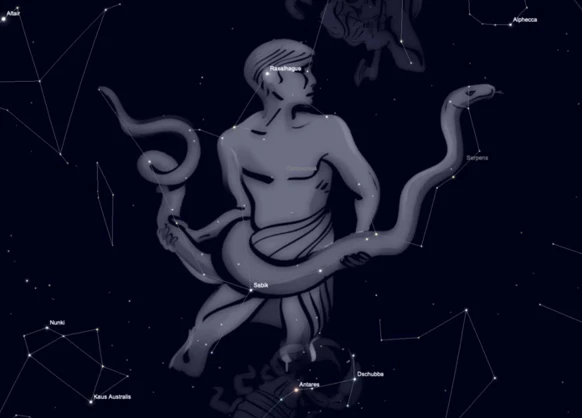The Ophiuchus Constellation: Unveiling its Enigmatic Symbolism
Deep within the vast night sky, there lies a constellation that has captivated astronomers, astrologers, and mythology enthusiasts for centuries. Known as Ophiuchus, this constellation holds a multitude of intriguing symbolism that sparks curiosity and fascination. From its mythological origins to its association with healing and wisdom, Ophiuchus entices us with its enigmatic allure. Its connection to astrology and its placement amidst the other constellations adds to the mystery that surrounds it. Join us on a journey to unravel the secrets and significance hidden within the Ophiuchus constellation.
Contents
- The Ophiuchus Constellation: A Brief Overview
- The Mythological Origins of Ophiuchus
- Symbolism in the Ophiuchus Constellation
- Ophiuchus and Astrology
- Connections with Other Constellations
- The Ophiuchus Enigma: Modern Interpretations
- Conclusion
-
Frequently Asked Questions
- 1. What does the name “Ophiuchus” mean?
- 2. How old is the Ophiuchus constellation?
- 3. Is Ophiuchus considered a zodiac sign?
- 4. What mythological figure is associated with Ophiuchus?
- 5. Are there any notable stars in the Ophiuchus constellation?
- 6. What is the significance of the serpent in Ophiuchus?
- 7. Can Ophiuchus be seen from both hemispheres?
- 8. Is there a constellation that is closely associated with Ophiuchus?
- 9. How does Ophiuchus relate to astrology?
- 10. Can Ophiuchus be seen with the naked eye?
- References
-
Frequently Asked Questions
- 1. Why is the Ophiuchus constellation less known and talked about compared to other constellations?
- 2. How does the Ophiuchus constellation connect with ancient Greek mythology?
- 3. What are some of the main symbols within the Ophiuchus constellation?
- 4. How does the addition of Ophiuchus to the Zodiac impact astrology?
- 5. What personality traits and characteristics are associated with Ophiuchus individuals?
- 6. How does the Ophiuchus constellation connect with other constellations?
- 7. What controversies exist within the interpretation of Ophiuchus in astrology?
- 8. What is the enigma surrounding the Ophiuchus constellation in modern times?
- 9. How can personal growth and transformation be associated with the Ophiuchus constellation?
- 10. What is the significance of the Ophiuchus constellation in relation to astronomy and astrology?
- References
- Read More
The Ophiuchus Constellation: A Brief Overview
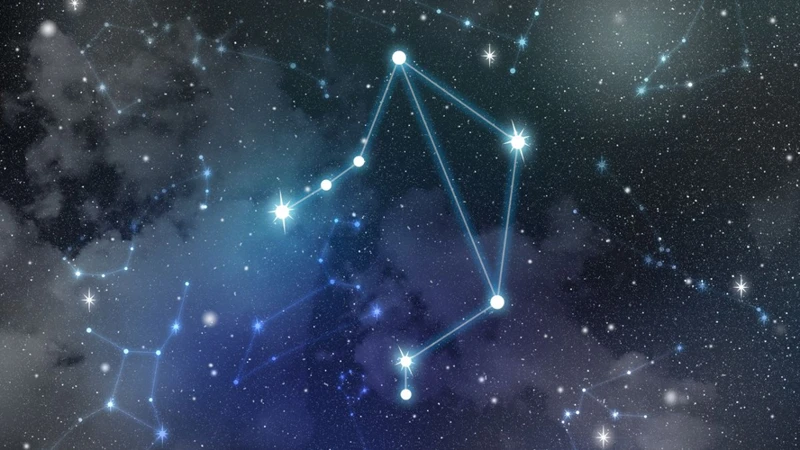
The Ophiuchus Constellation, located in the southern celestial hemisphere, is a prominent feature of the night sky. It spans over 948 square degrees, making it the largest constellation in the sky. Ophiuchus is situated between the constellations of Serpens and Hercules, with its brightest star, Rasalhague, shining brightly in the midst of this celestial tapestry. Astronomically, Ophiuchus is recognized as the 11th zodiac constellation, although it is not officially included in the traditional zodiac system. Despite its omission from the zodiac, Ophiuchus has a rich history, steeped in mythological and astrological significance. Its unique positioning and vibrant stars make it a captivating sight for stargazers and celestial enthusiasts alike. To further explore the intriguing symbolism behind Ophiuchus, we must delve into the mythological origins, symbolism, and astrological connections that shape its fascinating narrative.
Link: /heroic-figures-african-mythology/
The Mythological Origins of Ophiuchus
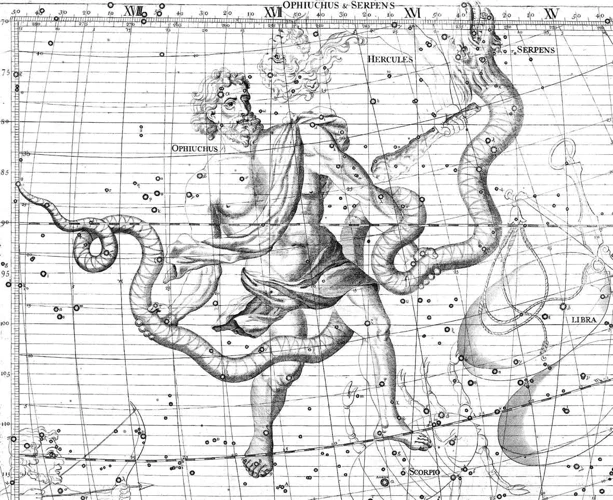
The Mythological Origins of Ophiuchus:
1. Ancient Greek Mythology:
In Greek mythology, Ophiuchus is associated with the figure of Asclepius, the god of medicine and healing. According to the legend, Asclepius possessed incredible healing abilities and was known for his skill in reviving the dead. His powers were so remarkable that Hades, god of the underworld, became concerned that Asclepius could upset the natural balance between life and death. As a result, Zeus, the king of gods, struck down Asclepius with a lightning bolt, immortalizing him in the stars as the constellation Ophiuchus.
2. Ophiuchus in Egyptian Mythology:
Similarly, Ophiuchus has ties to Egyptian mythology. The constellation is thought to represent Imhotep, an Egyptian deity associated with healing, medicine, and wisdom. Imhotep was a revered figure in ancient Egypt, known as the physician of the gods and credited with inventing numerous medical and architectural techniques. His inclusion in the Ophiuchus constellation showcases the cultural significance placed on healing and the pursuit of knowledge in Egyptian society.
The mythological origins of Ophiuchus demonstrate its connection to healing and medicine across different ancient civilizations. These tales highlight the reverence and respect for those who possess the ability to restore and nurture life. Whether through the Greek tradition of Asclepius or the Egyptian figure of Imhotep, Ophiuchus symbolizes the power and importance of the healing arts.
Link: /loki-norse-mythology/
1. Ancient Greek Mythology
In Ancient Greek mythology, the Ophiuchus constellation is associated with the legendary figure of Asclepius, the Greek god of healing and medicine. Asclepius was the son of Apollo, the god of healing, and Coronis, a mortal woman. Legend has it that Asclepius possessed remarkable healing abilities and was even able to resurrect the dead. This miraculous power alarmed Hades, the god of the underworld, who feared that the souls of the deceased would no longer enter his realm. In response, Zeus, the king of the gods, struck Asclepius down with a bolt of lightning, killing him. To honor his son’s exceptional healing skills, Zeus placed Asclepius in the stars as the constellation Ophiuchus. Thus, the Ophiuchus constellation became a symbol of healing and medicine, representing the remarkable powers and wisdom associated with Asclepius.
Link: /retrograde-planet-impact/
2. Ophiuchus in Egyptian Mythology
In Egyptian mythology, Ophiuchus holds a significant role, representing the deity Imhotep, the god of healing and medicine. Imhotep was greatly revered as a physician and a wise counselor, known for his exceptional knowledge and skill in the healing arts. He was often depicted as a man holding a staff with a serpent wrapped around it, symbolizing his connection to both healing and wisdom. The serpent, a prominent symbol in Egyptian mythology, was believed to possess transformative and regenerative powers. The association of Ophiuchus with Imhotep underscores the constellation’s connection with healing and medicine in ancient Egyptian culture. Imhotep’s wisdom and teachings were highly regarded, placing him among the most revered deities in Egyptian mythology. The presence of Ophiuchus in Egyptian mythology emphasizes the constellation’s enduring significance and its ties to the realms of health, wisdom, and spiritual transformation.
Symbolism in the Ophiuchus Constellation
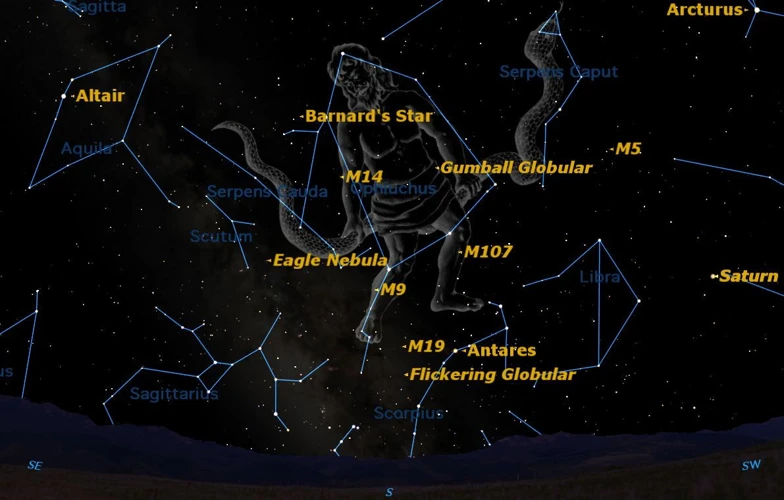
Symbolism in the Ophiuchus Constellation can be traced back to its name, which is derived from the Greek word for “serpent bearer” or “serpent holder”. As such, one of the key symbols associated with Ophiuchus is the serpent. In various mythologies, serpents hold significant meaning, representing knowledge, transformation, and healing. The serpent intertwining within the constellation’s boundaries is said to represent the power of healing and medicine. This symbolism is believed to be connected to the mythological figure of Asclepius, who was associated with the art of healing in Greek mythology. The staff of Asclepius, entwined by a snake, is a well-known symbol of medicine and is often used in modern healthcare emblems. Ophiuchus also symbolizes wisdom and knowledge due to its association with the Greek god Apollo, who was revered for his intellect and insight. The constellation’s position in the sky, with its head pointed towards the center of the Milky Way galaxy, adds to its symbolism of cosmic awareness and enlightenment. The symbolism embedded within the Ophiuchus Constellation invites contemplation and intrigue, connecting us to ancient beliefs and the mysteries of the universe.
1. Serpent Symbolism
Serpents hold a significant place in the symbolism associated with the Ophiuchus constellation. In various mythologies and cultural beliefs, serpents have been regarded as powerful and mystical creatures, representing transformation, rebirth, and healing. Within the context of Ophiuchus, the serpent symbolism is twofold. Firstly, it is embodied in the figure of Ophiuchus, who is often depicted as a man holding a snake. This image is believed to represent Asclepius, the Greek god of healing and medicine, who was known for his ability to restore life and rejuvenate the sick. The snake coiled around Asclepius’s staff, known as the Rod of Asclepius, has become a well-known medical symbol to this day. Secondly, the presence of the serpents’ constellation, Serpens, which is split into two parts – Serpens Caput and Serpens Cauda – further emphasizes the serpent motif. The intertwining serpents in the night sky evoke imagery of healing and transformation, encapsulating the essence of the Ophiuchus constellation.
Link: None.
2. Healing and Medicine
The Ophiuchus constellation holds a deep connection with healing and medicine, adding another layer of symbolism to its enigmatic nature. In ancient mythology, Ophiuchus is often associated with the Greek god Asclepius, the deity of healing and medicine. Asclepius was believed to possess extraordinary healing abilities and was revered as a master physician. This association is reflected in the depiction of Ophiuchus as a figure holding a serpent, which has long been associated with healing and rebirth. The serpent, symbolic of rejuvenation and renewal, intertwines with the mythological narrative of Ophiuchus. The presence of Ophiuchus in the night sky reminds us of the intrinsic connection between the celestial realm and the pursuit of well-being. This symbolism serves as a potent reminder of the power of healing and the importance of maintaining balance within ourselves and the world around us. The recognition of healing and medicine within the Ophiuchus constellation adds a profound dimension to its allure and continues to inspire those who explore its celestial mysteries.
3. Wisdom and Knowledge
Wisdom and knowledge play a significant role in the symbolism of the Ophiuchus constellation. In ancient Greek mythology, Ophiuchus represents the figure of Asclepius, the god of healing and medicine. Asclepius was known for his exceptional wisdom and healing abilities, revered as a master of medicinal arts and the embodiment of wisdom. This association with wisdom is further emphasized by the serpent that is often depicted in the constellation’s imagery. In mythology, serpents have long been regarded as symbols of transformation, knowledge, and spiritual awakening. The intertwining nature of the serpent within the constellation represents the intertwining of wisdom and healing, suggesting that healing requires not only physical remedies but also the wisdom and knowledge to achieve true holistic well-being. Ophiuchus, with its connection to wisdom and knowledge, reminds us of the importance of seeking wisdom, expanding our knowledge, and applying it to benefit ourselves and others.
Ophiuchus and Astrology

Ophiuchus has a peculiar relationship with astrology, as it has often been overlooked and excluded from the traditional zodiac system. However, there is a growing interest in incorporating Ophiuchus into astrological practices. One of the main reasons for this resurgence is the procession of the equinoxes, which has caused a shift in the alignment of the constellations over the centuries. Advocates for including Ophiuchus argue that it should be recognized as the 13th zodiac sign. They propose that individuals born between November 29th and December 17th are actually Ophiuchus natives, characterized by their unique personality traits and characteristics.
Personality Traits and Characteristics: Those associated with Ophiuchus are believed to possess a diverse range of qualities. They are often seen as charismatic, intelligent, and intuitive individuals, with a natural inclination towards spirituality and healing. Ophiuchus natives are thought to have a deep understanding of human emotions and a strong desire to make a positive impact on the world. They possess the ability to draw people in with their magnetic personality, and their wisdom and knowledge are highly valued by those around them.
While the inclusion of Ophiuchus in astrology remains a topic of debate, many individuals resonate with the traits and symbolism associated with this constellation. Whether seen as a missing link in the zodiac or as a distinct entity beyond the traditional astrological framework, Ophiuchus continues to captivate those with an interest in the stars and their influence on our lives.
1. The Addition of Ophiuchus to the Zodiac
The addition of Ophiuchus to the zodiac is a topic that has sparked intrigue and heated debates among astrologers and enthusiasts. While the traditional zodiac system consists of twelve constellations, each associated with a particular astrological sign, Ophiuchus presents a challenge to this established framework. Ophiuchus is often considered the 13th zodiac sign, positioned between Scorpio and Sagittarius. Proponents of including Ophiuchus argue that its presence in the sky warrants its recognition, as it aligns with the sun’s path for about 18 days. This suggests that astrological traits associated with Ophiuchus may hold significance for those born during its period. However, critics reject the inclusion of Ophiuchus, emphasizing the historical significance and traditional nature of the twelve-zodiac system. This contentious debate continues to ignite discourse within the astrology community, leaving us to ponder the potential impact of Ophiuchus on the intricate tapestry of zodiac sign interpretations.
2. Personality Traits and Characteristics
Personality Traits and Characteristics of Ophiuchus:
1. Independent Thinkers: Those born under the Ophiuchus constellation are often known for their independent thinking and a tendency to follow their own path. They have a unique perspective on life and are not easily swayed by societal norms or expectations.
2. Strong Intuition: Ophiuchus individuals possess a heightened sense of intuition. They have a remarkable ability to tap into their instincts and trust their gut feelings, allowing them to navigate through life with an uncanny sense of direction.
3. Empathetic and Compassionate: Ophiuchus individuals are known for their deep empathy and compassion towards others. They have a natural inclination to help those in need and are often drawn to careers in healing professions or social activism.
4. Seekers of Knowledge: People born under the influence of Ophiuchus have a thirst for knowledge and are lifelong learners. They are constantly seeking to expand their understanding of the world and are attracted to intellectual pursuits.
5. Magnetic and Charismatic: Ophiuchus individuals possess a natural magnetism and charisma that draws others towards them. They have a captivating presence and often leave a lasting impression on those they encounter.
6. Tendency for Restlessness: Individuals with the Ophiuchus energy may experience periodic restlessness and a craving for change or adventure. They may feel a need to constantly evolve and explore new horizons in their personal and professional lives.
It is important to note that while these characteristics are associated with Ophiuchus, individual personalities may vary based on other astrological factors, such as moon sign and rising sign influences.
Link: /loki-norse-mythology/
Connections with Other Constellations
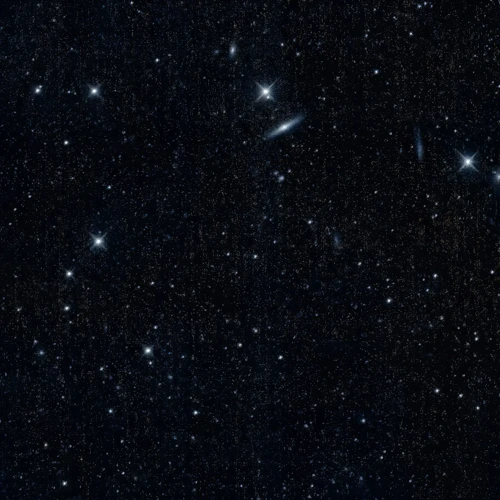
Connections with Other Constellations
The Ophiuchus constellation shares intriguing connections with several neighboring constellations, adding depth and complexity to its cosmic narrative.
1. Serpens and Serpens Caput: Ophiuchus is closely associated with the Serpens constellation, which is divided into two distinct parts – Serpens Caput (the serpent’s head) and Serpens Cauda (the serpent’s tail). Ophiuchus is located between these two serpent sections, symbolizing the serpent-handler and healer’s close relationship with these celestial serpents.
2. Hercules and Ophiuchus: In Greek mythology, Hercules is known for his battles with various mythical creatures, one of which includes a fight with a massive serpent. This battle is depicted in the constellations Hercules and Ophiuchus, emphasizing the connection between the two. The proximity of Ophiuchus and Hercules in the night sky represents the ongoing struggle of man against the forces of darkness and chaos.
3. Scorpius: Ophiuchus also interacts with the Scorpius constellation. According to ancient mythology, Ophiuchus is depicted as holding a serpent while standing over Scorpius, seemingly in combat. This symbolic representation signifies the eternal struggle between healing and poison, knowledge and malevolence.
4. Draco: Ophiuchus is in proximity to the Draco constellation, representing the celestial dragon. The presence of Ophiuchus near Draco adds another layer of mythical significance, hinting at the hidden wisdom and power contained within the constellation.
The interconnectedness of Ophiuchus with these neighboring constellations creates a rich tapestry of symbolism and mythology in the night sky, offering endless possibilities for interpretation and exploration.
Link: None
1. Serpens and Serpens Caput
1. Serpens and Serpens Caput
Adjacent to the Ophiuchus constellation lies the intertwined constellations of Serpens and Serpens Caput, known as the Serpent and Serpent’s Head, respectively. These constellations often find their place intertwined with Ophiuchus in various mythologies and interpretations. Serpens can be seen as a long, winding serpent, while Serpens Caput represents the snake’s head. Together, they depict a powerful, serpentine entity intertwined with the figure of Ophiuchus.
In Greek mythology, this connection is closely linked to the story of Asclepius, the ancient Greek god of medicine. Asclepius, who was said to possess the ability to heal the sick and even resurrect the dead, was often associated with serpents. According to legend, Asclepius learned the art of healing by observing a snake bringing herbs to injured serpents, thus symbolizing the close connection between serpents, medicine, and healing.
The integration of Serpens and Serpens Caput within the Ophiuchus constellation further emphasizes the role of serpents as symbols of wisdom, transformation, and healing. This symbolism can be seen across various cultures throughout history, from ancient Egyptian beliefs in serpent deities to the association of snakes with healing and rebirth in African folklore. The intertwining of Ophiuchus and these serpentine constellations serves as a visual representation of the intricate relationship between wisdom, medicine, and the transformative powers attributed to these celestial symbols.
Link: /heroic-figures-african-mythology/
2. Hercules and Ophiuchus
The connection between Hercules and Ophiuchus lies in their proximity in the night sky, as well as in their shared mythology. Hercules, known for his strength and heroic endeavors, is a prominent constellation neighboring Ophiuchus. According to Greek mythology, Hercules was tasked with completing twelve labors as punishment for killing his wife and children in a fit of madness. One of these labors involved battling and defeating a monstrous serpent known as the Hydra. In this legendary battle, Hercules received assistance from Ophiuchus, who provided him with a plant that had the power to heal wounds. Ophiuchus’s role as a healer and helper is immortalized in the sky, depicting a man grasping a serpent, symbolizing the mythological connection to this fabled battle. This portrayal not only highlights their intertwined mythology but also emphasizes the significance of healing and overcoming challenges in one’s journey. The presence of both Hercules and Ophiuchus in the night sky serves as a reminder of the power of resilience and the continuous battle between dark and light forces.
The Ophiuchus Enigma: Modern Interpretations
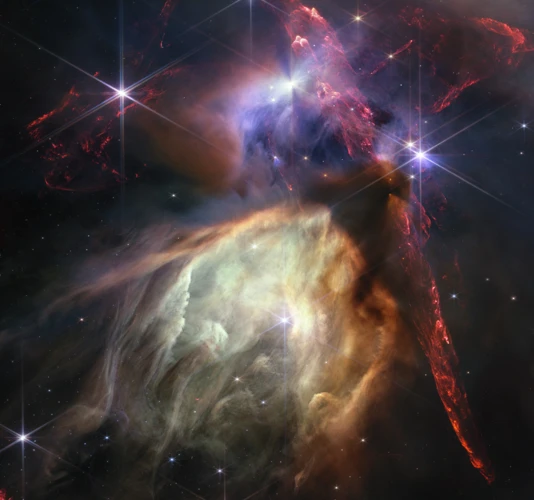
The Ophiuchus constellation continues to be a subject of fascination and debate in modern times, leading to various interpretations and theories. One aspect that fuels the Ophiuchus enigma is its connection to astrology. Some astrologers argue for the inclusion of Ophiuchus as the 13th zodiac sign, contending that its influence over our lives and personalities has been overlooked. They propose that those born between November 29th and December 17th should identify with Ophiuchus traits, which include wisdom, healing, and a deep connection to spirituality. This alternative perspective has sparked discussions about the validity and impact of Ophiuchus in the astrological world. Another modern interpretation of Ophiuchus revolves around personal growth and transformation. Many individuals believe that the constellation’s symbolism represents the journey of self-discovery, promoting inner healing and the pursuit of wisdom. Ophiuchus is seen as a guide for those seeking to shed their old skins and embrace transformative change. The enigmatic nature of Ophiuchus allows for a multitude of interpretations, each captivating in its own right.
Link: /retrograde-planet-impact/
1. Astrological Controversies
Astrological Controversies surround the inclusion of Ophiuchus in the zodiac system. Traditionally, the zodiac consisted of twelve constellations, each representing a specific astrological sign. However, the discovery and recognition of Ophiuchus as the 13th constellation has stirred debates and disagreements within the astrological community. Some argue that Ophiuchus should be included as a legitimate sign, which would shift the dates and characteristics assigned to the other zodiac signs. This controversy has led to lively discussions and discourse among astrologers, who explore the potential influence and traits associated with individuals born under the Ophiuchus sign. Some propose that Ophiuchus embodies qualities such as intuition, healing abilities, and wisdom, creating a distinct personality profile for those born during its designated time period. Others dismiss the inclusion of Ophiuchus as unnecessary, preferring to adhere to the traditional twelve-sign system. Despite the controversies, Ophiuchus continues to pique the interest and curiosity of astrology enthusiasts, sparking ongoing discussions and exploration of its potential impact on the zodiac landscape.
2. Personal Growth and Transformation
Personal growth and transformation are themes that resonate strongly with the enigmatic Ophiuchus constellation. In astrology, individuals born under the sign of Ophiuchus are believed to possess innate qualities that promote self-discovery and evolution. These individuals are often described as intuitive, introspective, and driven by a deep desire for spiritual enlightenment. The symbolism of the serpent, a prominent motif within Ophiuchus, further reinforces the theme of transformation. Snakes shedding their skin represent the process of renewal and rebirth, reflective of the personal growth journey that Ophiuchus individuals may embark upon. Ophiuchus encourages individuals to embrace change, face challenges head-on, and harness their inherent wisdom to unlock their full potential. It serves as a reminder that growth often arises from confronting and transcending obstacles, leading to a profound transformation of the self.
Conclusion

In conclusion, the Ophiuchus constellation holds a captivating allure that has resonated throughout history. From its mythological origins in Greek and Egyptian mythology to its representation of healing, wisdom, and serpents, Ophiuchus continues to spark intrigue and curiosity. The addition of Ophiuchus to the zodiac system and the controversies surrounding its astrological significance have further deepened the enigma that surrounds this constellation. The connections between Ophiuchus and other constellations, such as Serpens, Serpens Caput, and Hercules, add layers of complexity and symbolism to its story. Modern interpretations of Ophiuchus range from debates in astrology to personal growth and transformation. The mystery and symbolism behind Ophiuchus continue to captivate our imagination and invite us to explore the depths of the cosmos. As we gaze into the night sky, may the presence of Ophiuchus remind us of the endless wonders that lie beyond our reach.
Link: /loki-norse-mythology/
Frequently Asked Questions

1. What does the name “Ophiuchus” mean?
The name “Ophiuchus” is derived from the Greek word “Ophioukhos,” which translates to “serpent bearer” or “serpent holder.” It reflects the association of the constellation with the figure of a man holding a serpent.
2. How old is the Ophiuchus constellation?
The Ophiuchus constellation has been observed and documented for thousands of years. It has origins in ancient Greek and Egyptian civilizations and holds significance in various mythologies throughout history.
3. Is Ophiuchus considered a zodiac sign?
While Ophiuchus is recognized as the 11th zodiac constellation, it is not officially included as a zodiac sign in most Western astrological systems. However, some astrologers incorporate Ophiuchus into their practices and believe it carries distinct traits and influences.
4. What mythological figure is associated with Ophiuchus?
Ophiuchus is often associated with the mythological figure Asclepius, the ancient Greek god of medicine and healing. Asclepius was known for his ability to resurrect the dead and his expertise in the art of medicine.
5. Are there any notable stars in the Ophiuchus constellation?
Yes, the Ophiuchus constellation boasts several notable stars. One of the most prominent is Rasalhague (Alpha Ophiuchi), a binary star system that is approximately 47 light-years away from Earth and shines with a blue-white hue.
6. What is the significance of the serpent in Ophiuchus?
The serpent symbol in Ophiuchus represents both wisdom and healing. In mythology, it is believed that Asclepius used a serpent-entwined staff, known as the Caduceus, as a symbol of healing and rejuvenation.
7. Can Ophiuchus be seen from both hemispheres?
Yes, Ophiuchus is visible from both the northern and southern hemispheres. However, it is more prominently seen in the southern celestial hemisphere.
8. Is there a constellation that is closely associated with Ophiuchus?
Yes, the constellation Serpens is closely associated with Ophiuchus. It is divided into two parts, Serpens Caput (the serpent’s head) and Serpens Cauda (the serpent’s tail), and is often depicted as the serpent held by Ophiuchus.
9. How does Ophiuchus relate to astrology?
Ophiuchus has gained attention in recent years as it is sometimes considered an additional zodiac sign. Those born under this sign are believed to possess traits such as intellect, healing abilities, and a desire for knowledge.
10. Can Ophiuchus be seen with the naked eye?
Yes, Ophiuchus can be seen with the naked eye, particularly in areas with minimal light pollution. Its brightest stars are visible, and the distinct shape formed by the constellation is discernible to observers.
References
Frequently Asked Questions

1. Why is the Ophiuchus constellation less known and talked about compared to other constellations?
The Ophiuchus constellation is less known and talked about because it was not recognized as one of the traditional Zodiac constellations until recently. It lies along the celestial equator, making it difficult to spot in many parts of the world. However, its intriguing symbolism and unique mythology have gained attention in recent years.
2. How does the Ophiuchus constellation connect with ancient Greek mythology?
In ancient Greek mythology, Ophiuchus is associated with Asclepius, the god of medicine and healing. Asclepius was known for his ability to bring the dead back to life and his skills in the art of healing. The Ophiuchus constellation represents Asclepius holding a serpent, symbolizing the quest for knowledge and the power of healing.
3. What are some of the main symbols within the Ophiuchus constellation?
The Ophiuchus constellation is often associated with serpent symbolism, representing wisdom, transformation, and rebirth. Additionally, it is connected to the concept of healing and medicine, reflecting the mythological association with Asclepius, the Greek god of healing.
4. How does the addition of Ophiuchus to the Zodiac impact astrology?
The addition of Ophiuchus to the Zodiac challenges the traditional twelve sign system. Some astrologers argue that the new zodiac sign alters the dates and characteristics of individuals born under different signs. However, this change is not universally accepted, and it has sparked debates within the astrological community.
5. What personality traits and characteristics are associated with Ophiuchus individuals?
Ophiuchus individuals are said to possess traits such as wisdom, intuition, healing abilities, and a deep desire for knowledge. They are often seen as spiritual seekers who have a strong sense of justice and a compassionate nature.
6. How does the Ophiuchus constellation connect with other constellations?
The Ophiuchus constellation is connected to the neighboring constellations of Serpens and Hercules. Serpens is divided into two parts, Serpens Caput (the serpent’s head) and Serpens Cauda (the serpent’s tail), which are often depicted entwined around Ophiuchus. Hercules is also closely associated with Ophiuchus in Greek mythology.
7. What controversies exist within the interpretation of Ophiuchus in astrology?
The interpretation of Ophiuchus in astrology has sparked controversies, with some astrologers arguing that it disrupts the traditional Zodiac system. Skeptics question the validity of Ophiuchus as a zodiac sign and its influence on an individual’s horoscope. These debates continue to generate interest and discussion among astrology enthusiasts.
8. What is the enigma surrounding the Ophiuchus constellation in modern times?
The enigma surrounding the Ophiuchus constellation in modern times lies in its recent recognition as a potential thirteenth Zodiac sign. This discovery has led to speculation about its impact on astrology, personal transformations, and the potential shift in astrological beliefs and practices.
9. How can personal growth and transformation be associated with the Ophiuchus constellation?
The Ophiuchus constellation represents personal growth and transformation due to its connections with healing, wisdom, and rebirth. Individuals who resonate with Ophiuchus symbolism may find themselves on a path of self-discovery, embracing their intuition, and seeking knowledge to facilitate personal transformation.
10. What is the significance of the Ophiuchus constellation in relation to astronomy and astrology?
The significance of the Ophiuchus constellation lies in its rich mythological origins, symbolism, and its potential impact on both astronomy and astrology. It challenges traditional beliefs, sparks debates, and invites individuals to explore deeper connections between the cosmos and human existence.

